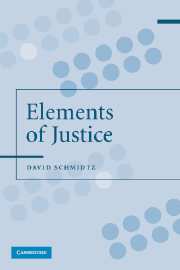Book contents
- Frontmatter
- Contents
- Acknowledgments
- PART 1 WHAT IS JUSTICE?
- PART 2 HOW TO DESERVE
- 6 Desert
- 7 What Did I Do to Deserve This?
- 8 Deserving a Chance
- 9 Deserving and Earning
- 10 Grounding Desert
- 11 Desert as Institutional Artifact
- 12 The Limits of Desert
- PART 3 HOW TO RECIPROCATE
- PART 4 EQUAL RESPECT AND EQUAL SHARES
- PART 5 MEDITATIONS ON NEED
- PART 6 THE RIGHT TO DISTRIBUTE
- References
- Index
12 - The Limits of Desert
Published online by Cambridge University Press: 05 June 2012
- Frontmatter
- Contents
- Acknowledgments
- PART 1 WHAT IS JUSTICE?
- PART 2 HOW TO DESERVE
- 6 Desert
- 7 What Did I Do to Deserve This?
- 8 Deserving a Chance
- 9 Deserving and Earning
- 10 Grounding Desert
- 11 Desert as Institutional Artifact
- 12 The Limits of Desert
- PART 3 HOW TO RECIPROCATE
- PART 4 EQUAL RESPECT AND EQUAL SHARES
- PART 5 MEDITATIONS ON NEED
- PART 6 THE RIGHT TO DISTRIBUTE
- References
- Index
Summary
Thesis: Conceptions of desert respond to people as active agents. Conceptions of entitlement respond to people as separate agents.
WHOSE PERFORMANCE IS IT?
Did Wilt Chamberlain do justice to the potential given to him by luck of the draw in the natural lottery? One possible answer is that whether he did justice to his potential is no one else's business. Wilt is not indebted to anyone for his natural assets. He did not borrow his talent from a common pool. No account is out of balance merely by virtue of Wilt having characteristics that make him Wilt. Still, even if it is no one else's business whether Wilt does justice to his potential, the fact remains that one way or another, Wilt will do, or fail to do, justice to it.
Part of our reason for thinking it is Wilt rather than you or me who deserves credit for the excellence of Wilt's performance is that, as David Miller puts it, “the performance is entirely his.” Note: The issue is not whether the performance is Wilt's rather than the Big Bang's; the issue is whether the performance is Wilt's rather than some other person's. The question of whether to credit Wilt for his performance is never a question of whether Wilt caused himself to have his character and talent. Instead, the question is whether the character, talent, or other desert-making inputs are, after all, Wilt's, rather than some other person's.
- Type
- Chapter
- Information
- The Elements of Justice , pp. 66 - 70Publisher: Cambridge University PressPrint publication year: 2006



